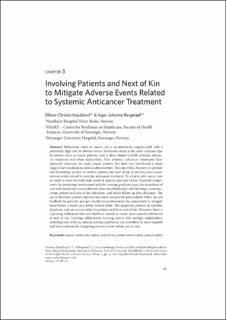Involving patients and next of kin to mitigate adverse events related to systemic anticancer treatment
Chapter
Published version
Permanent lenke
https://hdl.handle.net/11250/3063642Utgivelsesdato
2022Metadata
Vis full innførselSamlinger
Originalversjon
Haukland, E. C., & Bergerød, I. J. (2022). Involving Patients and Next of Kin to Mitigate Adverse. In: Olsen, R., & Sletvold, H. (Eds.). Medication Safety in Municipal Health and Care Services. Oslo: Cappelen Damm Akademisk/NOASP (Nordic Open Access Scholarly Publishing), p. 43-70. 10.23865/noasp.172.ch3Sammendrag
Medication safety in cancer care is an inherently complex field, with a potentially high risk for adverse events. Medication harm is the most common type of adverse event in cancer patients, and is often related to both systemic anticancer treatment and other medications. New systemic anticancer treatments have improved outcomes for many cancer patients, but have also introduced a whole range of new medication-related adverse events. The aim of this chapter is to provide new knowledge on how to involve patients and next of kin to prevent unnecessary adverse events related to systemic anticancer treatment. To achieve safer cancer care we need to meet the individual needs of patients and next of kin. Essential components for preserving involvement include: creating good processes for transitions of care with medication reconciliation, structured facilitation and discharge communication; patient and next of kin education; and timely follow-up after discharge. The use of electronic patient-reported outcomes can provide personalized follow-up and feedback for patients, and give healthcare professionals the opportunity to mitigate harm before it results in a severe adverse event. This empowers patients in everyday situations, and can ensure safety for patients and their next of kin. Moreover, there is a growing realization that such feedback should co-create more sound involvement of next of kin. Creating collaborative learning arenas with multiple stakeholders, including next of kin as natural and equal partners, can contribute to more targeted real-time solutions for mitigating adverse events within cancer care. Involving patients and next of kin to mitigate adverse events related to systemic anticancer treatment

